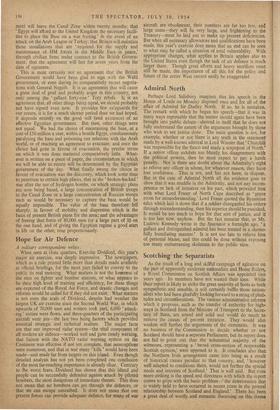Admiral North
Perhaps Lord Salisbury imagines that his speech in the House of Lords on Monday disposed once and for all of the affair of Admiral Sir Dudley North. If so, he is mistaken. The remark with which he began his speech—that it was in many ways regrettable that the matter should again have been brought into public debate—showed in itself that he does not fully understand the nature of the arguments brought by those who wish to see justice done. The main question is not, for example, whether or not 'there is any truth in the statement made by a well-known admiral to Lord Winster that Churchill was responsible for the fiasco and made a scapegoat of North.' If a senior officer exhibits too bluntly his disagreement with the political powers, then he must expect to pay a harsh penalty. Nor is there any doubt about the Admiralty's right to relieve any officer in whom, for whatever reason, they have lost confidence. That is not, and has not been, in dispute. But in the case of Admiral North all the evidence goes to show that it was muddle in the Admiralty, and not any incom- petence or lack of initiative on his part, which provided him with what Lord Fraser of North Cape described as grave room for misunderstanding.' Lord Fraser quoted the Byzantine edict which laid it down that if a soldier disregarded his orders through misunderstanding, then his superior should be punished. It would be too much to hope for that sort of justice, and it is too late now, anyhow. But the fact remains that, as Mr, Ludovic Kennedy wrote in the Spectator a fortnight ago, ' a gallant and distinguished admiral has been treated in a shame- fully humiliating manner.' It is not too late to relieve him of personal blame, and this could be done without exposing too many embarrassing skeletons to the public view.


































 Previous page
Previous page